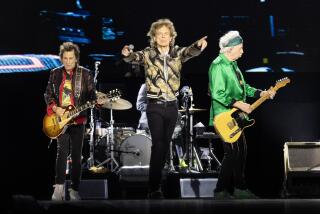Soviet Rockers Roll Into San Diego Tonight
- Share via
SAN DIEGO — Madonna wouldn’t stand for it. Prince would be appalled.
When Avtograf, a Soviet rock band performing at the Bacchanal nightclub tonight, tours the Soviet Union, they receive at most a meager 70 rubles, or $100, per concert--despite selling out 6,000-seat arenas at $3 or $4 a ticket.
Not exactly an arrangement that would win favor among the megabucks rockers of America.
“We have a different system,” said Alexander Sitkovetskiy, Avtograf’s guitarist and leader, in a recent interview. “Rock musicians in our country make enough to live better than the workers, but they’re not so rich as Elton John and Madonna.
“In America and Europe, the performers get most of the money from ticket sales. But in the Soviet Union, most of the money is divided between the arena and the producer, to cover expenses and to pay the people who work there.”
Despite the low wage, neither Sitkovetskiy nor any other Russian musician is complaining these days. Because by all indications, the Iron Curtain is finally lifting on rock ‘n’ roll.
“Yes, it is,” Sitkovetskiy said of Soviet rock band Avtograf. “And the fact that we are here now, in America, proves it.”
Two weeks ago, Avtograf (which means--no big surprise here-- autograph in English) became the first Soviet government-sponsored rockers to tour the United States. The tour began Jan. 25 in Washington, D.C., and includes tonight’s stop in Kearny Mesa.
Sitkovetskiy, a classically trained music conservatory graduate from Moscow, has been tugging on the strings of the Iron Curtain, trying to lift it, since he formed his first rock band in 1972.
For more than a decade, he said, the Soviet bureaucracy was tugging equally hard on the other end, trying to keep the curtain down.
“Until recently, rock was considered a bastion of the West,” said Sitkovetskiy, 32. “It was maybe not forbidden, but it was looked down upon, and there were lots of problems.
“There were problems getting equipment, there were problems cutting demonstration tapes, and there were problems obtaining permits from the government to play arenas and theaters.
“As a result, the few rock bands that did exist were underground. We put up temporary recording studios wherever we could find room, and we played mostly in student halls and other small places where we didn’t need permits.”
In 1979, Sitkovetskiy and four other Muscovites--singer Artur Micheyev, bassist Leonid Gutkin, drummer Viktor Mikhalin, and keyboard player Leonid Makarovich--put together a new band, Avtograf, influenced by American rockers Journey and Chicago and by British progressive heavyweights Yes and Genesis.
Three years later, they gained “official” status in the Soviet Union and released their first--and only--album on the government-run Melodiya label.
But it wasn’t until Mikhail Gorbachev came to power in 1985 that the Iron Curtain really began to budge, thanks to glasnost , the Soviet leader’s policy of cross-cultural openness and exchange, Sitkovetskiy said.
“Gorbachev was the turning point for everything in this country,” Sitkovetskiy said. “Gorbachev and glasnost opened up a lot of opportunities and possibilities that had never before been available, particularly in the arts.
“And for rock bands, these opportunities and possibilities were endless. We were finally allowed to come up from the underground and perform and record wherever we wanted.”
Before long, Avtograf began touring the Soviet Union and other Eastern Bloc nations. In 1986, it picked up a Laureate award, the Soviet equivalent of an American Grammy.
By then, their album and two subsequent singles had sold more than six million copies in the Soviet Union alone.
Western eyes first focused on Avtograf in 1985, when they participated in Bob Geldof’s “Live-Aid” concert, which benefited African famine victims and was beamed by satellite all around the world.
Last year, they were the only Soviet band to perform at Bill Graham’s “Glasnost” concert, which took place in Moscow July 4 and capped an international peace march from Leningrad to Moscow. Also appearing at the show were the Doobie Brothers, James Taylor and Carlos Santana.
“Right now, not less than 300 or 400 Soviet rock bands have records out and are going on tour,” Sitkovetskiy said. “Even amateur bands, consisting of teachers and engineers who are playing music only for fun, are allowed to perform in big arenas, as long as they’re popular enough.
“Gorbachev and glasnost have brought about a new era for everyone in our country. So many things have changed in just the last few years--not only in the way people live, but in the way they think, in the way they perceive both themselves and the rest of the world.
“For example, when I was growing up, it was impossible to get records by Western rock bands like the Beatles, the Rolling Stones, Grand Funk Railroad and Led Zeppelin,” Sitkovetskiy said. “The only way to get them was through our parents and friends who went abroad and brought them back. But now, we can buy most of these records in our own country.”
Still, at least financially, the Iron Curtain remains down.
“It’s ridiculous, but right now, we have to live with it. Still, things in this country are continuing to change, and I’m sure that in the next two or three years, it will be a little different.”
More to Read
The biggest entertainment stories
Get our big stories about Hollywood, film, television, music, arts, culture and more right in your inbox as soon as they publish.
You may occasionally receive promotional content from the Los Angeles Times.







